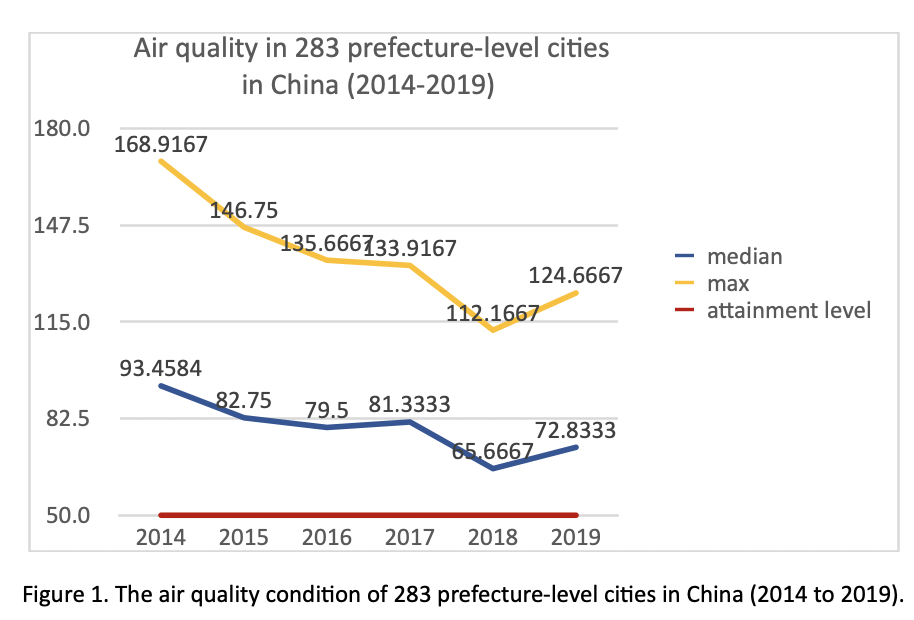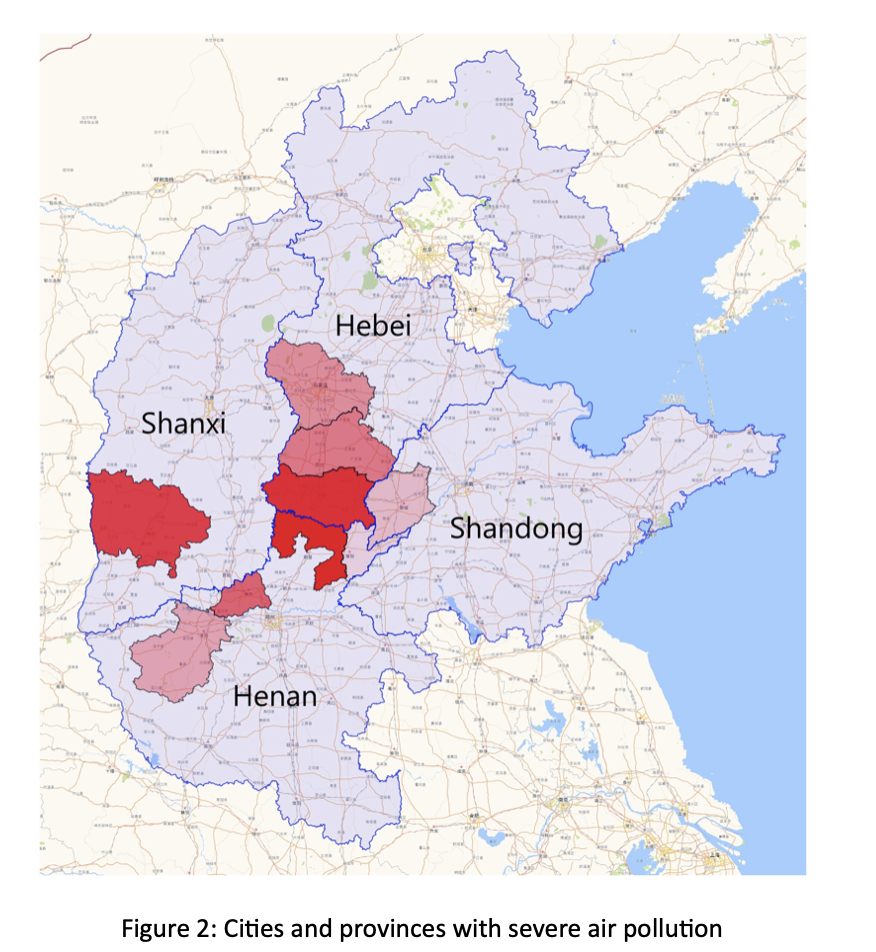Our recent study, which is published by Energy Policy, shows that an improvement in air quality, an environmental amenity, will not only enhance the health and wellbeing of residents, but also offer some economic benefits to local housing markets.
This study utilises China as a case study. Air pollution has emerged as a severe issue in China due to its rapid economic development and urbanisation since the implementation of its ‘open-door’ policy in the 1970s (Zhang et al, 2019). As shown in Figure 1, a high level of air pollution in China has been observed based on the median air quality index of 283 cities, although some improvement has been evident in recent years.

As of 31 December 2019, air pollution was more severe in four provinces (Hebei, Shandong, Henan and Shanxi) in which the most polluted nine cities are mainly located in these four provinces as shown in Figure 2.

Extensive studies have demonstrated the impact of air quality on the health and wellbeing of residents (eg, Dauchet et al, 2018; He et al, 2018). An increase in demand for cleaner air, therefore, has been evident. The Chinese government had also implemented numerous policies to control the deterioration of air quality; thereby the health and wellbeing of Chinese residents can be enhanced (Wang et al, 2021). However, little studies have been placed to understand the potential economic benefits to local housing markets.
Air quality, an environment amenity, reflects the significant benefits to all residents
To offer a complete understanding of the air quality effect, this study, unlike previous studies, investigates the value of cleaner air in both housing sales and rental markets that have been somewhat overlooked in the literature.
The impact of air quality on housing prices and rents are demonstrated via empirical models. The results suggest that air pollution exerts a significant negative influence on housing markets, including both rental and sales markets. This reflects that all residents (both home buyers and renters) value air quality. More specifically, our modelling results reveal that a 10% increase in AQI (a worsening of air quality) is associated with a decline of 11.4 yuan/m2 in housing price. This confirms that a deterioration of air quality leads to a reduced sale price of houses. In other words, home buyers do value air quality.
Turning our attention to the rental market, our modelling results also show that a significant negative effect is found in that a 10% increase in AQI leads to a decrease of 0.37 yuan/month/m2 in rents. Results here indicate that renters also pay a premium for cleaner air, suggesting the economic benefit of cleaner air is not confined to home buyers. Our further posthoc analysis shows that the difference between the impact of air quality on housing sale and rental prices is statistically insignificant, indicating that air quality is a type of environmental amenity that is valued equally by all residents. This suggests that home buyers and renters have similar preferences in which all residents are beneficiaries of air quality.
A higher price premium on cleaner air is evident in large and medium-size cities
A closer look into the impact of air quality in different cities, a disaggregated analysis, has been undertaken. Results suggest that residents, including both homeowners and renters, in larger cities (Tiers 1, 2 and 3) are willing to pay a higher price for cleaner air. However, no comparable evidence is evident in smaller cities (Tiers 4 and 5). The results indicate that the impact of air quality varies across submarkets and tiers. This also contributes to the ongoing discussion of housing market segmentation (Bangura and Lee, 2021).
Conclusion
To sum up, an improvement in air quality not only would enhance the health and wellbeing of residents, but also the economic benefits to local housing markets. Importantly, both home buyers and renters value air quality and their preferences for air quality are homogenous. Despite this study using the dataset of Chinese cities, which have a serious air pollution issue, the findings would be useful for policymakers internationally.
References
Bangura, M & Lee, CL 2021, ‘The determinants of homeownership affordability in Greater Sydney: evidence from a submarket analysis’, Housing Studies, pp 1-27. DOI: 10.1080/02673037.2021.1879995
Dauchet, L, Hulo, S, Cherot-Kornobis, N, Matran, R, Amouyel, P, Edmé, JL & Giovannelli, J 2018, ‘Short-term exposure to air pollution: Associations with lung function and inflammatory markers in non-smoking, healthy adults’, Environment International, vol 121, pp 610-9.
He, S, Tang, S, Xiao, Y & Cheke, RA 2018, ‘Stochastic Modelling of Air Pollution Impacts on Respiratory Infection Risk’, Bulletin of Mathematical Biology, vol 80, no 12, pp 3127-53.
Wang, J, Lee, CL & Shirowzhan, S 2021, ‘Macro-Impacts of Air Quality on Property Values in China – A Meta‐Regression Analysis of the Literature’, Buildings, vol 11, no 2, p 48. https://doi.org/10.3390/buildings11020048
Zhang, J, Lee, C L, & Chan, N (2019). The asymmetric effect of institutional quality on Chinese outward real estate investment. International Journal of Strategic Property Management, 23(6), 435-449.
This is a media summary of the full article of Wang, J and Lee, CL (2021), ‘The Value of Air Quality in Housing Markets: A Comparative Study of Housing Sale and Rental Markets in China’, Energy Policy. https://doi.org/10.1016/j.enpol.2021.112601.








